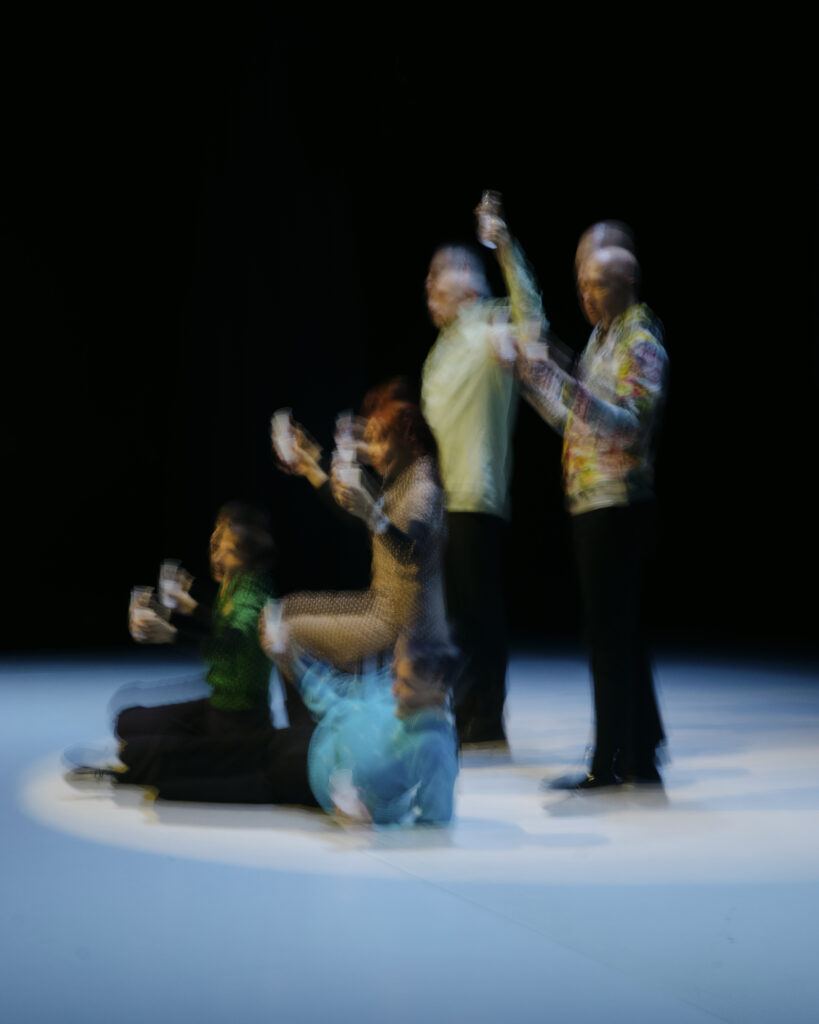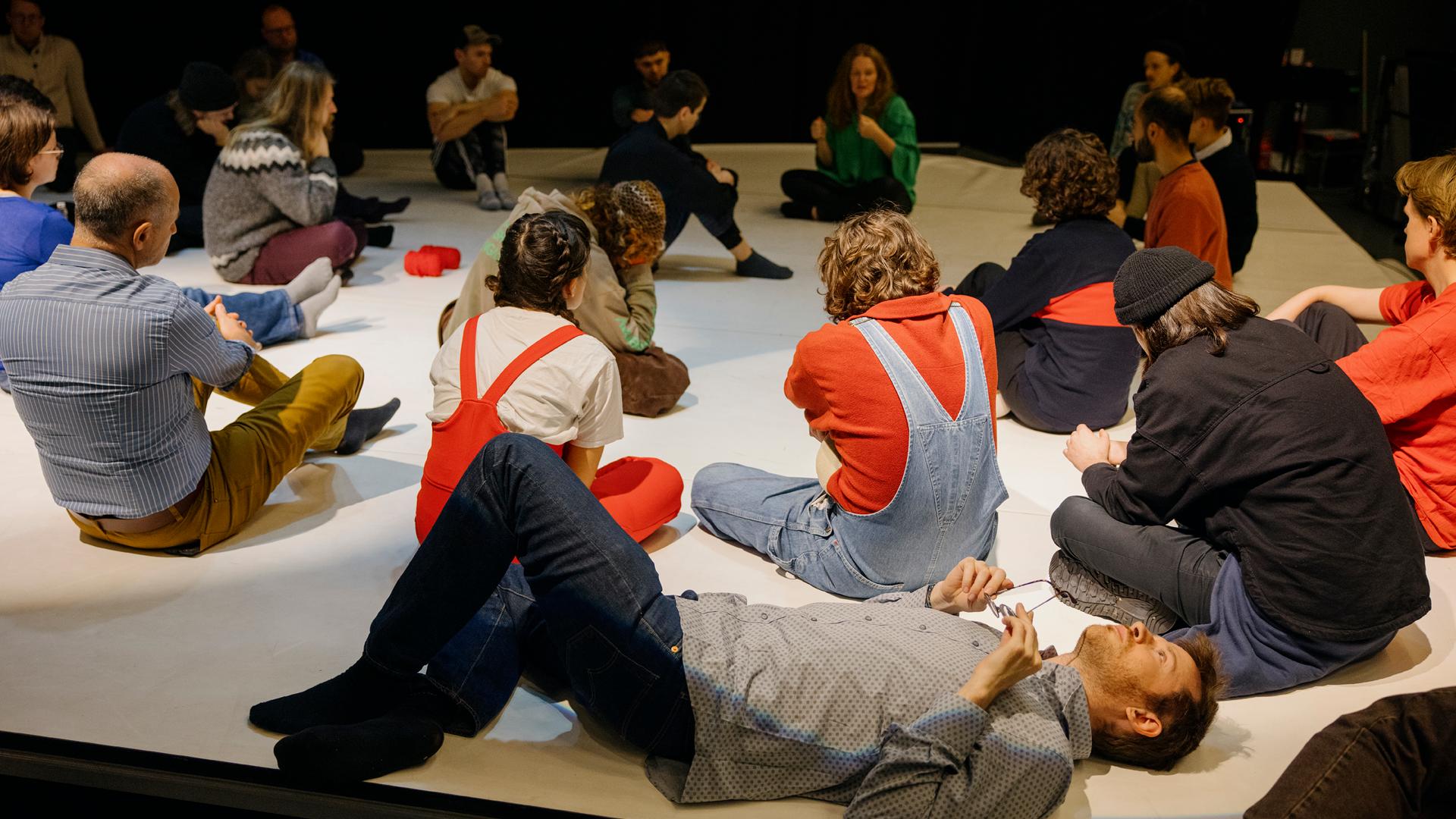Die deutsche Übersetzung des Gesprächs findet Ihr weiter unten.
Roberto Beseler Maxwell
What is the definition or meaning behind »expanded music«?
Mikkel Schou
Instead of having a very clear definition, the curation of MINU is more focused on exploring an expanded idea of music and what it can be. We focus on commissioning and collaborating with artists, who are already working with artistic material and formats that are at the edge of what is typically considered music. There are some common formal denominators, such as artistic inter- and transdisciplinarity, a suspicion towards abstract music, a strong conceptual vision, and a liberal approach to musical material where the first step is to disregard the idea that musical material must start with an instrument, synthesizer, voice or similar. Not understood as a radical moving away from the more standardized musical world but rather an understanding that in the first place using standard means to make music, is in itself a somewhat strange and uncritical artistic decision to make. To name an obvious example, it still seems important and relevant for contemporary piano writing to find a way to reconcile its instruments past as a facilitator of western cultural oppression or at least be aware of that embeddedness. Regardless, we are also just very interested in exploring the outer limits of what can be used as material for a composition, and how this changes the way we engage with it. Does a work of music even have to use sounds? Last year we presented one work which was made entirely of still images, yet the method of working with the material was distinctly compositional.
RBW
How do you regard the term »New Music«, is it still relevant to you?
MS
MINU is not happening in an artistic vacuum, and it’s also hard to imagine how it could be. The initial reason we started the festival was that Dylan and I wanted to very specifically present things we liked and were interested in within the broader spectrum of New Music. There’s plenty of trends which we find very interesting but also a lot of tendencies that aren’t relevant to us. Last year we presented »Die Maulwerker« – a vocal ensemble/performance art group, who’s been at the forefront of reinventing music theater for the last 30 years. Other developments such as new conceptualism and the tendencies towards creating immersive and very specifically situated concert situations are also very present in our programming. Less interesting is the continued focus on instrumental writing, understood in this sense as the creation of works which »anyone with x qualification« can perform. We find it much more interesting when compositions are created for and with very specific artists in mind. Additionally, we are trying to work in a meta-curatorial way and are very concerned with the festival as a whole, though it’s often challenging to mediate all the different parts of it successfully. We are also very oriented towards the local New Music scene, and hope that the festival can hack it a little and offer something different. And through the curation of the festival encourage and empower local artists to explore different ways of working, for instance by incorporating skill sets from other artistic disciplines in their practice as integral elements in their music making.
RBW
Something that could be seen as »new«: You also do publications parallel to the festival, how come?
MS
This is a part of our profile that seems important to me to expand on. Festivals have a huge potential when it comes to enriching the critical discussion about music and art. It’s not just about disseminating or promoting events, but also about qualifying the discourse about art by challenging the normative narrative (understood as a general discourse in e.g. mainstream magazines, newspapers or similar, that art or music should be predominantly oriented towards entertainment, sounding and looking good, creating engaging experiences for an audience or similar bias) and positioning the artworks, and their dissemination, in opposition to a superficial consumerist approach that is more oriented towards entertainment and spectacles. It’s also an interesting way to reach out to new audience groups and to break down the borders between different genre communities.
RBW
What can we expect for the future from MINU Festival?
MS
A long term thing will most likely be a gradual transition from a ›music‹ festival towards a more ›time-based art‹ festival. Most likely we will still keep a general format of five days and a very intense festival experience. We want to position MINU as a somewhat small-scale festival, both to keep the curation very tight, and also to be more of a challenging supplement to the other festivals in Denmark. One thing to expect will be a continual development of new formats for events and activities, and also a focus on presenting artworks that explore new formats for both the works and audience experience.

Roberto Beseler Maxwell:
Was ist die Definition oder Bedeutung von »erweiterter Musik«?
Mikkel Schou:
Anstatt eine klare Definition zu haben, konzentriert sich die Kuration von MINU eher auf die Erforschung einer erweiterten Idee von Musik und was sie sein kann. Wir konzentrieren uns darauf, mit Künstler:innen zusammenzuarbeiten, deren künstlerische Arbeit sich bereits an der Grenze dessen bewegt, was üblicherweise als Musik angesehen wird. Es gibt einige gemeinsame formale Nenner, wie z. B. künstlerische Inter- und Transdisziplinarität, ein Misstrauen gegenüber abstrakter Musik, eine starke konzeptionelle Vision und eine liberale Herangehensweise an musikalisches Material. Diese Herangehensweise besteht zunächst einmal darin, die Vorstellung außer Acht zu lassen, dass musikalisches Material mit einem Instrument, Synthesizer, einer Stimme oder Ähnlichem beginnen muss. Dies ist nicht als radikale Abkehr von der eher standardisierten Musikwelt zu verstehen, sondern eher als ein Verständnis davon, dass die Verwendung von Standardmitteln zum Musikmachen an sich schon eine etwas seltsame und unkritische künstlerische Entscheidung ist. Um ein Beispiel zu nennen: für das zeitgenössische Klavierspiel ist es immer noch wichtig und relevant, sich mit der Vergangenheit des Instruments als Vermittler westlicher kultureller Unterdrückung zu beschäftigen oder sich zumindest dieser Vergangenheit bewusst zu sein. Unabhängig davon sind wir auch sehr daran interessiert, die äußeren Grenzen dessen zu erforschen, was als Material für eine Komposition verwendet werden kann, und wie dies unsere Auseinandersetzung mit ihr verändert. Muss ein Musikstück überhaupt Klänge verwenden? Letztes Jahr haben wir eine Arbeit präsentiert, das ausschließlich aus Standbildern bestand. Aber die Methode, mit dem Material zu arbeiten, war eindeutig kompositorisch.
RBW:
Was haltet Ihr von dem Begriff »Neue Musik«, ist er für Euch noch relevant?
MS:
MINU findet nicht in einem künstlerischen Vakuum statt, das wäre auch schwer vorstellbar. Der ursprüngliche Grund, warum wir das Festival ins Leben gerufen haben, war, dass Dylan und ich ganz gezielt Dinge präsentieren wollten, die uns innerhalb des breiteren Spektrums der Neuen Musik gefallen und interessieren. Es gibt viele Trends, die wir sehr interessant finden, aber auch eine Menge Tendenzen, die für uns nicht relevant sind. Letztes Jahr haben wir »Die Maulwerker« präsentiert – ein Vokalensemble oder Performance-Kunst-Gruppe, die seit 30 Jahren an vorderster Front das Musiktheater neu erfindet. Auch andere Entwicklungen wie der neue Konzeptualismus und die Tendenz, immersive und sehr spezifische Konzertsituationen zu schaffen, sind in unserem Programm sehr präsent. Weniger interessant für uns ist die anhaltende Fokussierung auf das instrumentale Schreiben, womit wir das Schaffen von Werken meinen, die »jede:r mit x Qualifikationen« aufführen kann. Wir finden es viel interessanter, wenn Kompositionen für und mit ganz bestimmten Künstler:innen geschaffen werden. Außerdem versuchen wir, metakuratorisch zu arbeiten, und sind sehr um das Festival als Ganzes bemüht, auch wenn es oft eine Herausforderung ist, all die verschiedenen Teile des Festivals erfolgreich zu vermitteln. Wir orientieren uns auch sehr an der lokalen Neuen Musikszene und hoffen, dass das Festival sie ein wenig aufmischen und etwas anderes bieten kann. Und durch die Kuratierung des Festivals ermutigen und befähigen wir lokale Künstler:innen, andere Arbeitsweisen zu erforschen, indem sie zum Beispiel Methoden aus anderen künstlerischen Disziplinen als integrale Elemente in ihre Musikproduktion einbeziehen.
RBW:
Etwas, das man als »neu« bezeichnen könnte: Ihr macht parallel zum Festival auch Publikationen, wie kommt das?
MS:
Das ist ein wichtiger Teil unseres Festivals, den ich gerne noch mehr ausbauen mächte. Festivals haben ein großes Potenzial, kritische Diskussionen über Musik und Kunst zu bereichern. Es geht nicht nur darum, Veranstaltungen zu machen. Es geht auch darum, den Diskurs über Kunst weiterzuentwickeln, indem man das normative Narrativ in Frage stellt, dass Musik in erster Linie Unterhaltung sein sollte, und anstattdessen Kunst und ihre Verbreitung von oberflächlichen, konsumorientierten Ansätzen abgrenzt. Das ist auch ein interessanter Weg, neue Publikumsgruppen anzusprechen und die Grenzen zwischen verschiedenen Genregemeinschaften zu überwinden.
RBW:
Was können wir für die Zukunft vom MINU Festival erwarten?
MS:
Langfristig wird es wahrscheinlich einen allmählichen Übergang von einem »Musik«-Festival zu einem Festival für zeitbasierte Kunst geben. Höchstwahrscheinlich werden wir das Format von fünf Tagen und dem sehr intensiven Festivalerlebnis beibehalten. Wir wollen MINU als ein etwas kleineres Festival positionieren, sowohl um die Kuration sehr straff zu halten, als auch um eine anspruchsvolle Ergänzung zu den anderen Festivals in Dänemark zu sein. Eine Sache, die man erwarten kann, ist die kontinuierliche Entwicklung neuer Formate für Veranstaltungen und Aktivitäten sowie ein Fokus auf die Präsentation von Kunstwerken, die neue Formate sowohl für die Werke als auch für das Publikum erkunden.

Mikkel Schou ist künstlerischer Co-Leiter des MINU_Festival_for_expanded_Music in Copenhagen. Nebenbei gründete er das Ensemble K!ART.. Er studierte zeitgenössische Musikperformance und Gitarre am Det Jyske Musikkonservatorium in Aarhus und schloss seine Postgraduiertenstudien am Königlichen Dänischen Konservatorium ab.
